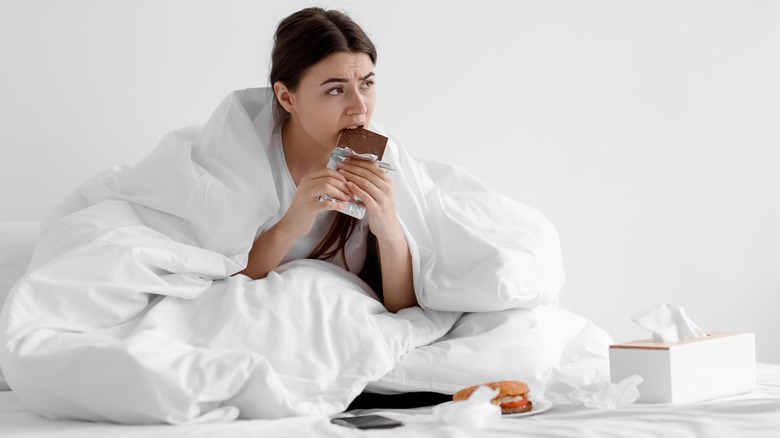How Depression Can Affect Your Appetite
Most people have experienced days when they felt blue and didn't want to get out of bed. For those living with depression, these days are a common occurrence. According to the National Institute of Mental Health (NIMH), over 8% of U.S. adults had a depressive episode in 2020. For 2.5% of American adults, depression can be chronic and long-lasting, coming and going several times throughout their life (per NIMH). Symptoms of depression include sadness, hopelessness, loss of interest in regular activities, and suicidal ideation (per Mayo Clinic).
Some of these symptoms may seem obvious. However, other signs of depression aren't so clear. For instance, body aches and brain fog can be features of depression for some people, but because they're symptoms of many other conditions, people may not associate them with mental health.
Another unexpected place to look for signs of depression is your appetite. According to Dr. W. Kyle Simmons from the Laureate Institute for Brain Research and The University of Tulsa (via Psych Congress Network), changes in appetite — along with weight gain or loss — are common but often overlooked indicators of depression. Around half of those struggling with depression experience a decrease in appetite, while one-third experience an increase. Here's why these appetite changes occur and how to cope.
Depression and appetite loss
For many people who struggle with depression, things that were once enjoyable — including favorite foods — begin to lose their appeal. This can lead to a loss of appetite, where the desire to eat stops or is greatly reduced. "Many people with depression lose both energy and interest. This can include a loss of interest in eating," Dr. Gary Kennedy, director of geriatric psychiatry, explained to Everyday Health. "This may be especially true for older people with depression, who may lose interest in cooking and don't have the energy to prepare meals. For others, nausea may be a symptom of their depression and a cause for loss of appetite."
Another explanation for low appetite is related to taste. According to a 2018 study published in Laryngoscope Investigative Otolaryngology, nearly a quarter of older adults experiencing depression also reported a loss of taste and smell. Additionally, some antidepressants can cause an unpleasant bitter or metallic taste (per PsychCentral). Changing to a different antidepressant may help.
In other instances of depression-related appetite loss, Priory, a provider of behavioral treatment in the U.K., suggests sticking to a meal plan and taking a multivitamin to get proper nutrition. It also recommends engaging in physical activity to stimulate appetite naturally. Be sure to speak to your doctor before making changes to your diet.
Depression and overeating
Feeling emotionally low may trigger overeating in some people. Healthline explains that depressive overeating is related more to an individual's need for emotional relief than to the body's hunger. When people overeat due to depression, they may find it hard to stop eating, even if their stomach is full.
Registered dietician Debra J. Johnston told Everyday Health that eating food produces certain chemicals in the brain, creating a feeling of fullness that "improves mood through positive association with happier times." This can temporarily create a soothing effect and help people forget about their depression.
However, overeating may also trigger feelings of guilt or shame for some, worsening depression symptoms. To gain control of emotional overeating and eat healthy when you're dealing with depression, HelpGuide.org recommends identifying triggers, such as stress. Then, turn to alternatives when you're triggered, such as calling a friend or going for a walk. Taking a moment to pause before grabbing a snack can help you decide if you're actually hungry or just seeking emotional relief.
If you or someone you know needs help with mental health, please contact the Crisis Text Line by texting HOME to 741741, call the National Alliance on Mental Illness helpline at 1-800-950-NAMI (6264), or visit the National Institute of Mental Health website.



